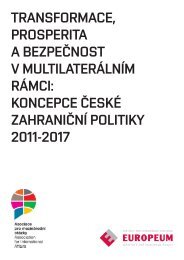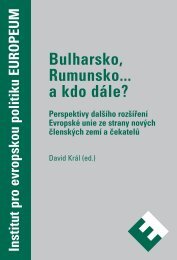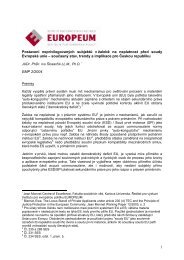eu constitutionalisation - EUROPEUM Institute for European Policy
eu constitutionalisation - EUROPEUM Institute for European Policy
eu constitutionalisation - EUROPEUM Institute for European Policy
Create successful ePaper yourself
Turn your PDF publications into a flip-book with our unique Google optimized e-Paper software.
Chapter 5: The <strong>European</strong> Constitution and the Re<strong>for</strong>m of External Competencesagreements (Art. III-316 and III-317(2) CT). The same applies to economic,financial and technical cooperation with third countries (Art. III-319 CT)⁸⁰and humanitarian aid (III-321 CT).V.4.3. Development Cooperation (Art. III-316 to III-318 CT)A substantial novelty in the provision on development cooperation is theemphasis on the primary objective of reducing and, in the long term, eradicatingpoverty (Art. III-316 para 1 CT). Despite the general obligation in Art.III-292 CT, Art. III-316 para 1 CT once more underlines the Union’s commitment“to take account of the objectives of development cooperation in the policiesthat it implements which are likely to affect developing countries”. Both Union andmember states are moreover held to “comply with the commitments and takeaccount of the objectives they have approved in the context of the United Nations andother competent international organisations” (Art. III-316 para 2 CT). Internally,development cooperation policy shall be implemented through <strong>European</strong>laws or framework laws, as well as multi-annual cooperation programmes.Art. III-317 CT contains the legal basis <strong>for</strong> the conclusion of agreements withthird countries and competent international organisations to achieve theobjectives referred to in Articles III-292 and III-316 CT. Also, the <strong>European</strong>Investment Bank is held to contribute, under the terms laid down in itsstatute, to the implementation of development cooperation policy (Art.III-317 para 3 CT). Art. III-318 CT furthermore includes a mutual obligation<strong>for</strong> coordination and consultation between Union and member states, “inorder to promote the complementarity and efficiency of their action”.V.4.4. Economic, Financial and Technical Cooperationwith Third Countries (Art III-319 and III-320)Art. III-319 CT essentially reproduces current Art 181a TEC. It empowersthe Union to carry out economic, financial and technical cooperationmeasures, including assistance and, in particular financial assistance, with80) Interestingly, the field of economic, financial and technical cooperation with third countries (Art. III-221) isnot specifically attributed to a competence category in Part I CT, unless one assumes that the reference inArt. I-14(4) CT relates to the entire chapter on cooperation with third countries and humanitarian aid. Yet,also Art. III-319(3) CT <strong>for</strong>esees that in the sphere of external relations, the member states’ competence tonegotiate in international bodies and to conclude international agreements shall not be prejudiced by theexercise of Union competences in this field. On the basis of this provision, the systemic integration of Art.III-319 CT in Chapter IV of Title V and the residual character of shared competences, it may be concludedthat also Art. III-319 CT confers shared competence by excluding pre-emption.180Chapter 5: The <strong>European</strong> Constitution and the Re<strong>for</strong>m of External Competencesthird countries other than developing countries. A progress in comparisonto Art 181a TEC is certainly the introduction of the legislative procedure<strong>for</strong> decision-making. The requirement <strong>for</strong> unanimity regarding agreementsunder Art. III-319 CT with countries that are candidates <strong>for</strong> accessionremains unchanged.An additional legal base is awarded in Art. III-320 CT <strong>for</strong> adopting the necessary<strong>European</strong> decisions, when the situation in a third country requiresurgent financial assistance. It allows the Council to adopt such measuresby qualified majority, instead of unanimity, as is presently the case underArt 308 TEC.⁸¹V.4.5. Humanitarian Aid (Art. III-321)Following current practice of Community action, the provision onhumanitarian aid may be regarded as another necessary extension of theCommunity competences in the field. It entitles the Union to implementoperations <strong>for</strong> ad hoc assistance and relief and protection <strong>for</strong> people inthird countries who are victims of natural or man-made disasters, in orderto meet the humanitarian needs resulting from these situations (Art. III-321 para 1 CT). Such operations would have to be concluded in compliancewith the principles of international law and with the principles ofimpartiality, n<strong>eu</strong>trality and non-discrimination (Art. III-321 para 2 CT). Asbecame evident in the Bangladesh case⁸² decisions on emergency aid, andparticularly the financial assistance linked to such decisions, brought aboutsome difficulties regarding the legal basis in the Treaty <strong>for</strong> a Communityhumanitarian aid policy.⁸³ In this judgment, the Court allowed memberstates to collectively finance emergency aid and to take decisions whenmeeting in the Council, yet acting outside the framework of the Treatyand of the budget. The current provision in the constitutional treaty bringsmatters of humanitarian aid within Union competence. This might alsoentail implications with regard to budgetary matters, given that the mainissue of dispute underlying the Bangladesh case was the Parliament’s claim81) Art. III-320 would provide the appropriate legal basis <strong>for</strong> the regulation on the rapid reaction mechanismscovering the reaction to crises both in developing and non-developing countries, which was adopted onthe basis of Art 308 TEC.82) Joined Cases C-181/91 and C-248/91, Parliament vs. Council and Commission, [1993] ECR I-3685.83) EECKHOUT (2004), p.108; compare also Regulation 1257/96, OJ L 163/1, 2 July 1996 which constitutesthe basis <strong>for</strong>t he Commission’s humanitarian activities world-wide and has been adopted as an thematicinstrument on the basis of Art 179(1) TEC.181








